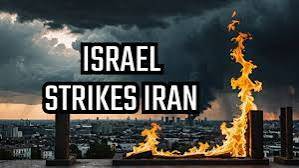Israel's Strikes on Iran: Breaking a 40-Year Taboo
In recent months, Israel has intensified its military operations against Iranian targets, signaling a significant shift in regional dynamics and breaking a long-standing 40-year taboo. This escalation has profound implications for Tehran, which now faces difficult strategic choices in response to the increased pressure from its historical adversary.
Historically, Israel has been cautious in its approach to Iran, largely refraining from direct military action due to the potential for retaliation and the risk of wider conflict. The last four decades have seen an intricate balance of power, with both nations engaging in proxy battles across the region rather than direct confrontation. This restraint stemmed from the recognition that any outright military engagement could spiral into a broader war involving multiple countries, particularly given Iran's regional alliances and its military capabilities.
However, the geopolitical landscape has changed dramatically. Israel’s concerns over Iran’s nuclear ambitions, combined with its support for groups hostile to Israel such as Hezbollah and Hamas, have led to a recalibration of its military strategy. The recent airstrikes targeting Iranian facilities and military assets in Syria and beyond represent a bold assertion of Israel's willingness to confront Tehran directly.
For Iran, this shift presents a dilemma. On one hand, the regime must demonstrate its resolve to its domestic audience, which includes hardliners who advocate for a more aggressive stance against Israel. On the other hand, Iran faces the reality of its military limitations and the potential consequences of escalating hostilities. The Iranian leadership must weigh its options carefully, considering both its national security and the broader implications for regional stability.
One possible response could be an increase in proxy warfare, where Iran utilizes its affiliated groups to strike at Israeli interests indirectly. This strategy allows Iran to maintain plausible deniability while still retaliating against perceived aggressions. However, such a move could provoke a stronger Israeli response, leading to a cycle of escalation that neither side may wish to endure.
Additionally, Iran may choose to enhance its missile capabilities and defensive systems, seeking to deter future Israeli strikes. This could involve strengthening partnerships with other countries that share its adversarial stance toward Israel, potentially leading to a new alignment in the region. The challenge for Tehran lies in securing these alliances while managing its economic struggles, particularly under the weight of international sanctions.
Diplomatically, Iran could also attempt to galvanize support from its allies, appealing to countries concerned about Israeli military aggression. This may involve a renewed focus on diplomatic channels to portray itself as a victim of unprovoked aggression, hoping to rally international support and pressure Israel to halt its operations.
Ultimately, the path Iran chooses will significantly impact the already volatile Middle East. Increased hostilities could lead to wider regional conflict, drawing in other powers and complicating the security landscape further. Conversely, a measured response may lead to a temporary easing of tensions, albeit at the cost of perceived weakness domestically.
As the situation unfolds, it is clear that both Israel and Iran are at a crossroads. The breaking of this long-standing taboo has not only altered the strategic calculations for both nations but has also set the stage for potential shifts in the broader geopolitical landscape. The choices Tehran faces are pivotal, not only for its own future but for the stability of the entire region. The coming months will likely reveal whether Iran will choose confrontation or caution in the face of increased Israeli aggression.


